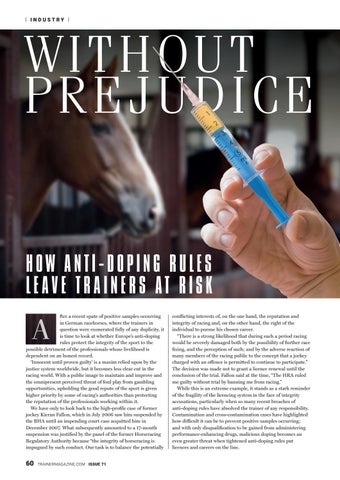| INDUSTRY |
WIT HOUT PR EJUDICE HOW ANTI-DOPING RULES LEAVE TRAINERS AT RISK
A
fter a recent spate of positive samples occurring in German racehorses, where the trainers in question were exonerated fully of any duplicity, it is time to look at whether Europe’s anti-doping rules protect the integrity of the sport to the possible detriment of the professionals whose livelihood is dependent on an honest record. ‘Innocent until proven guilty’ is a maxim relied upon by the justice system worldwide, but it becomes less clear cut in the racing world. With a public image to maintain and improve and the omnipresent perceived threat of foul play from gambling opportunities, upholding the good repute of the sport is given higher priority by some of racing’s authorities than protecting the reputation of the professionals working within it. We have only to look back to the high-profile case of former jockey Kieran Fallon, which in July 2006 saw him suspended by the BHA until an impending court case acquitted him in December 2007. What subsequently amounted to a 17-month suspension was justified by the panel of the former Horseracing Regulatory Authority because “the integrity of horseracing is impugned by such conduct. Our task is to balance the potentially
60
TRAINERMAGAZINE.COM ISSUE 71
conflicting interests of, on the one hand, the reputation and integrity of racing and, on the other hand, the right of the individual to pursue his chosen career. “There is a strong likelihood that during such a period racing would be severely damaged both by the possibility of further race fixing, and the perception of such; and by the adverse reaction of many members of the racing public to the concept that a jockey charged with an offence is permitted to continue to participate.” The decision was made not to grant a licence renewal until the conclusion of the trial. Fallon said at the time, “The HRA ruled me guilty without trial by banning me from racing.” While this is an extreme example, it stands as a stark reminder of the fragility of the licencing system in the face of integrity accusations, particularly when so many recent breaches of anti-doping rules have absolved the trainer of any responsibility. Contamination and cross-contamination cases have highlighted how difficult it can be to prevent positive samples occurring; and with only disqualification to be gained from administering performance-enhancing drugs, malicious doping becomes an even greater threat when tightened anti-doping rules put licences and careers on the line.
